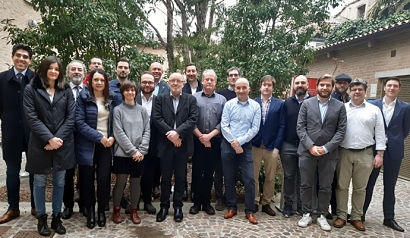
The Advisory Board comprises invited experts and specialists to provide independent review, advice and guidance on the progress of the project activities. All associates would directly benefit by exploiting the technology at their operational sites.
For the conversion of biogenic residues to sustainable advanced biofuels, Fraunhofer UMSICHT developed and completed a new technology, named Thermo-Catalytic Reforming (TCR). Starting from tests on a lab-scale unit to the fuel production demonstrated on a pilot scale, the TCR technology was then scaled-up to a 300 kg per hour plant for the conversion of sewage sludge at an industrial rate, financially supported by the Bavarian State Ministry of Economic Affairs, Infrastructure, Transport and Technology.
The ongoing step of a technical demonstrator development is part of the TO-SYN-FUEL project. The operational capacity is designed for 500 kg per hour of dried sewage sludge. This is the actual step of development before the technology reaches fully commercial scale.
The development process of the technology has shown a high potential in the utilisation of biomass and residues.
Experts of CIRSA, the Inter-Departmental Centre for Research in Environmental Sciences of the University of Bologna, are engaged in evaluating environmental performances and sustainability of current sewage sludge management and comparing these processes with the innovative solutions investigated in the project. Preliminary results from the life cycle assessment methodology have been reported during the meeting, analysing the first encouraging results related to the potential positive impacts on climate change.
“In this project we want to produce advanced biofuels from waste, which in this particular case will be sewage sludge” said Dr.-Ing. Robert Daschner, Head of the Renewable Energy Department at Fraunhofer UMSICHT and Project Management Officer. “We are building-up the plant and we will operate and demonstrate the technology in operation. By the end of the project we want to have a business case for sustainable green fuels in order to support the targets of the European Commission”.
The unit will be in operation from 2020 for around 5,000 hours and it will produce more than 200,000 litres of biocrude oil. TCR will be combined with pressure swing adsorption (PSA) and hydrodeoxygenation (HDO) technologies in an integrated plant.
The first demonstration site visit of the working plant is expected to be organized for interested stakeholders and potential early adopters of the technology within the next year.
For additional information:

